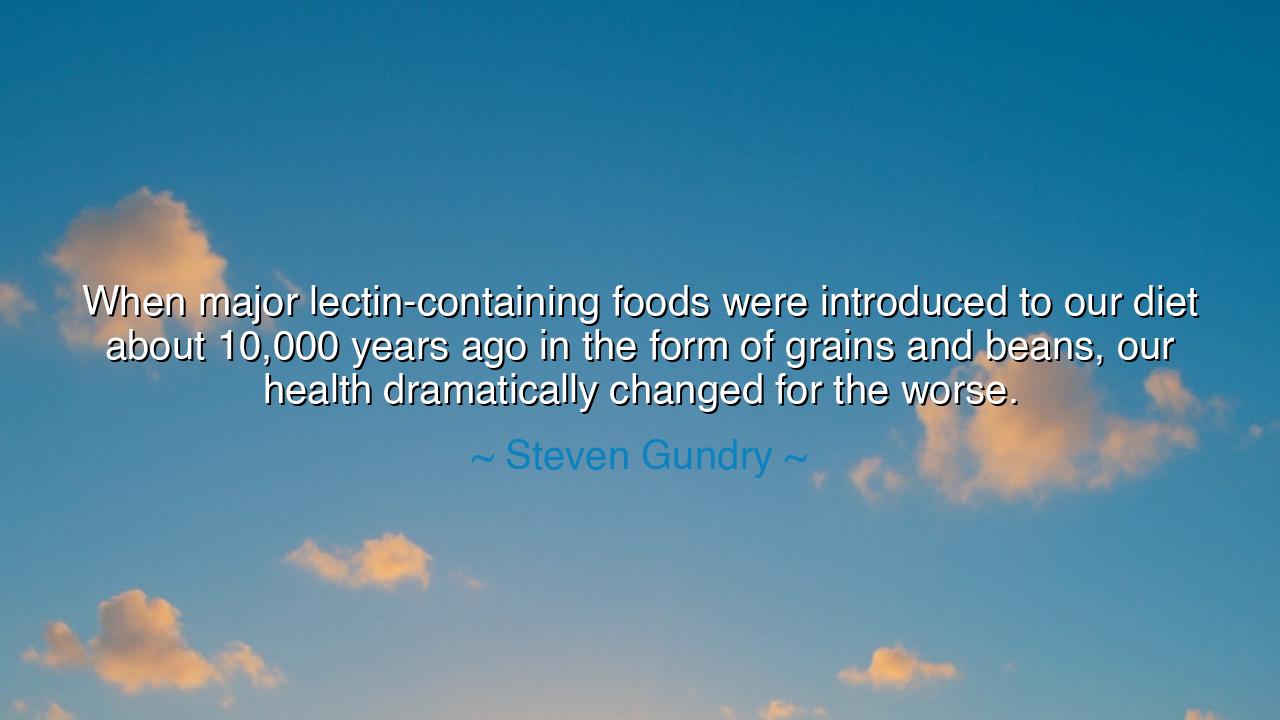
When major lectin-containing foods were introduced to our diet
When major lectin-containing foods were introduced to our diet about 10,000 years ago in the form of grains and beans, our health dramatically changed for the worse.






The words of Steven Gundry—“When major lectin-containing foods were introduced to our diet about 10,000 years ago in the form of grains and beans, our health dramatically changed for the worse”—speak with the gravity of a physician turned philosopher, a modern sage who dares to question the long march of civilization itself. Beneath this statement lies a lament not only about food, but about the cost of progress, the quiet trade of vitality for convenience, of harmony for abundance. Gundry’s words echo across millennia like a warning from the ancients: that when humankind departs from the natural order, when it forgets the balance that once bound body to earth, the price is paid in suffering.
The origin of this teaching lies in the dawn of agriculture—the Neolithic Revolution, that great turning point when humanity laid down its hunter’s tools and took up the plow. In that age, mankind learned to cultivate grains and legumes, foods dense in energy yet rich in lectins, plant proteins designed by nature to defend seeds from being eaten. These lectins, Gundry argues, did not serve the human body as fruit, roots, and wild meats once did; they brought with them inflammation, autoimmune distress, and the slow unraveling of the primal harmony between man and his nourishment. The hunter who once thrived upon the bounty of the earth became the farmer, dependent upon crops that subtly warred with his body. Thus, what seemed the birth of civilization was also the beginning of its ailment.
In the ancient world, wisdom often warned against such hubris—the belief that humankind could command nature without consequence. The myth of Prometheus, who stole fire from the gods, tells this same truth. Fire brought warmth, light, and progress, but also pain and punishment. So too did agriculture bring abundance and permanence, but at the hidden cost of health and freedom. The bones of early farmers, uncovered by archaeologists, reveal stunted growth and frailty compared to the robust frames of their hunter-gatherer ancestors. In our quest to master the land, we became its servants, feeding upon foods that filled our bellies but burdened our blood.
Yet Gundry’s words are not a condemnation of progress, but a call to remembrance. He asks that we listen once more to the wisdom of the body, to the ancient harmony our ancestors once knew. For within each of us still beats the heart of the forager, the primal intelligence that knows which foods heal and which harm. The earth, though changed, still offers us nourishment unspoiled by modern excess—foods untouched by lectins’ bitterness, foods that align with the natural rhythm of our biology. To eat as our ancestors did is not to reject civilization, but to reconcile it with nature’s truth.
Consider the example of the Masai people of East Africa, whose diet of milk, meat, and blood has nourished them for centuries. Free from grains and legumes, their bodies remained strong, their hearts resilient. In contrast, the agricultural empires of history—Egypt, Mesopotamia, even Rome—grew mighty on bread and beans, yet their citizens fell prey to ailments born of abundance: obesity, gout, heart disease. The lesson repeats through time—what sustains a civilization may not sustain a soul. The body remembers what the mind forgets: that not all plenty is prosperity.
In Gundry’s reflection lies a deeper warning, one that transcends diet. For lectins become a metaphor for all that is subtle and insidious in modern life—the habits we adopt believing them to be good, yet which erode us slowly from within. Just as lectins quietly inflame the gut, so too does modern excess inflame the spirit: overwork, overconsumption, overstimulation. The disease of the age is not hunger but imbalance—the loss of alignment between what we need and what we crave. The cure, as Gundry implies, is not found in denial but in restoration: to eat, live, and act in harmony with our deeper nature.
Let this, then, be the lesson carried forward: Seek harmony, not indulgence. Do not be deceived by the abundance of the modern table, nor the false promise of comfort. Whether in food or in life, what is easy is rarely what is right. Choose what nourishes, not what merely satisfies. Listen to your body—it speaks with the wisdom of your ancestors. Simplicity, balance, and awareness are the true healers of humankind.
So remember the words of Steven Gundry not as doctrine, but as an awakening. The story of human health is the story of forgetting and remembering—forgetting the natural wisdom of our origins, and remembering, once more, the sacred bond between life and the earth that sustains it. For when we return to that balance, when we eat and live in alignment with what is true, the body ceases to suffer, and the spirit, long burdened by modern excess, rises again to strength.






AAdministratorAdministrator
Welcome, honored guests. Please leave a comment, we will respond soon